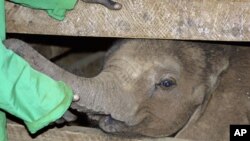Officials in Kenya say Chinese demand for ivory has prompted a surge in elephant poaching and the illegal smuggling of elephant tusks. Now authorities are looking at ways to curb demand and to better defend the elephant population.
Business is slow at an art market in downtown Nairobi. Some blame the falling value of the shilling, some blame the lack of tourists, but for whatever reason, artists are having a hard time selling their wood sculptures, their necklaces, t-shirts and paintings.
But one dealer, Harrison Onyango, said there is always demand for one forbidden item.
“Actually, the ivory trade is very much illegal here in Kenya, and we normally see tourists, especially Chinese, who are very much interested in ivory. But we normally tell them straight and up front that we don't deal in ivory because it's an illegal trade," said Onyango. "But to them they always insist and try and tell us just get me any type of ivory, I'll buy at any price, but we always try to tell them up front that is very much impossible.”
Stiff penalties, keen demand
Onyango said the penalties for selling ivory in Kenya, where the trade is completely banned, are so severe, it is not worth the risk.
But it is still being sold. Dr. Esmond Martin conducted a study of the illegal trade in conjunction with the British conservation group Elephant Family. He said ivory is typically smuggled out of the country raw and in bulk. It is taken to factories in China where it is carved and then sold out in the open.
“These shops are there to cater for Chinese and for foreigners, so nobody's going to hide ivory in the backstreet - nobody's going to see it - you see it everywhere, you see it in the most expensive hotels and in the most expensive areas in China, so we want the Chinese to implement their own law on the sale,” said Martin.
China won permission to import ivory in 2008 from an international wildlife trade convention known as CITES, after implementing a certification system labeling each legal ivory item with an official identification card.
Illegal ivory on upswing
Martin said since the ban was partially lifted, demand has increased in China, and he has seen evidence that more illegal ivory is making its way into the markets.
In his own surveys, Martin has seen a 50 percent increase in the number of ivory items being sold in parts of China since 2004, and that the majority of these are being sold without identification cards.
And elephants in Africa are increasingly threatened as a direct result.
“In the last few months, the elephant poaching has increased in parts of northern Kenya and this is due to various reasons, but most people think its due to the Chinese demand that's increased the price because most illegal ivory is going to China, it's as simple as that,” said Martin.
Fighting poaching
The Kenyan Wildlife Service [KWS] devotes much of its resources to combating poaching. KWS Species Expert Patrick Omandi said the agency has tried to raise awareness with the Chinese.
“We have hosted many Chinese delegations, you know, both from the private and the government sector, we've taken them through our challenges, and most of them, apparently, don't know that this ivory they use comes from poached elephants,” said Omandi.
A spokesperson for the Chinese embassy in Nairobi declined to comment on this topic.
Kenya has enjoyed a huge increase in Chinese investment in recent years, as Beijing looks to Africa for minerals and natural resources. China has spent millions of dollars to rehabilitate highways leading in and out of the Kenyan capital, and other projects including a new hospital.
Protecting elephants
Omandi said Kenya's economy, however, relies on its tourism - 70 percent of which is based around wildlife.
“For us, we are seeing our elephants as the backbone of our tourism, the backbone of our economy, and we see that we can make better use of elephants when it is alive than when it is dead,” he said.
Omandi said Kenya lost more than 80 percent of its elephant population before the CITES convention and a worldwide ivory ban was put in place in 1989. But he said since the ban, the population has more than doubled.
He worries, though, that allowing the partial trade of ivory, and the increased demand in China, have opened the window for more illegal killing.





